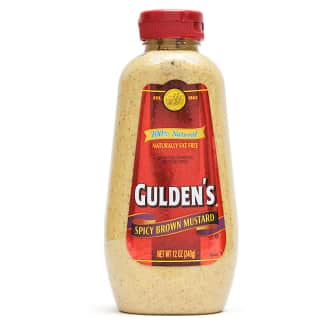Reviews You Can Trust.
See Why.
Dijon Mustard
What traits guarantee a Dijon mustard that packs a wallop of clean heat and balanced acidity? Youth and, surprisingly, a little fat.
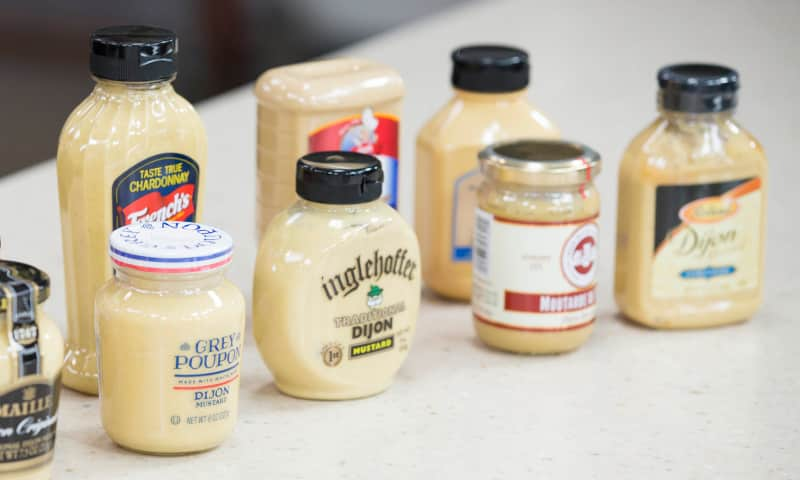
Top Pick
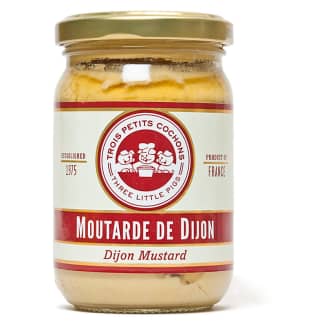
WinnerThree Little Pigs Dijon Mustard
Thanks to a high ratio of mustard seeds (it’s the only product we tasted to list them as the first ingredient), this pricey Dijon impressed tasters with “nasal-clearing” heat that “kicks in gradually” and “builds.” It was balanced, too, delivering just enough salt and “tangy,” “bright” flavor to even out its spiciness. Note: This product originally went by its French name, Trois Petits Cochons Moutarde de Dijon, but has since switched to the English equivalent.
Fat: 0.5 g
Sodium: 115 mg per teaspoon
Ingredients: Mustard seeds, vinegar, water, sea salt (may contain naturally occurring sulfites)
Price at Time of Testing: $6.99 for a 7-oz jar ($1.00 per oz)
Thanks to a high ratio of mustard seeds (it’s the only product we tasted to list them as the first ingredient), this pricey Dijon impressed tasters with “nasal-clearing” heat that “kicks in gradually” and “builds.” It was balanced, too, delivering just enough salt and “tangy,” “bright” flavor to even out its spiciness. Note: This product originally went by its French name, Trois Petits Cochons Moutarde de Dijon, but has since switched to the English equivalent.
Fat: 0.5 g
Sodium: 115 mg per teaspoon
Ingredients: Mustard seeds, vinegar, water, sea salt (may contain naturally occurring sulfites)
Price at Time of Testing: $6.99 for a 7-oz jar ($1.00 per oz)
Sign up for the Well-Equipped Cook newsletter
Shop smarter with our ATK Reviews team's expert guides and recommendations.
What You Need to Know
When Grey Poupon first posed its famous question to American television audiences 34 years ago, the company’s sophisticated French-style mustard (which is actually made in the United States) wouldn’t necessarily have been a pantry staple in most households. But over the years our taste for (and sales of) this spicy, smooth condiment has grown—to the tune of more than $45 million worth of mustard sold by Grey Poupon in this country each year.
In the test kitchen, we understand the appeal. Good Dijon mustard is creamy, with more body than conventional yellow mustard, and packs a wallop of clean, nose-tingling heat. We slather it on sandwiches, squirt it on hot dogs and sausages, and add it to everything from salad dressings and dips to pan sauces and glazes for roasted meats, fish, and vegetables.
When we last tasted Dijon mustards in 2008, Grey Poupon was our favorite for its “bold” yet “balanced” heat, but lately we’ve wondered if any other producers could top it. To find out, we purchased 10 Dijons made in the smooth style developed in France in the 1300s (we ignored coarse- and whole-grain products), tasting them plain and, to see how they paired with savory food, on boiled hot dogs.
As expected, clean flavor, intense heat, and creamy body were exactly the qualities we liked in a Dijon. Those that were “sweet,” “too mild,” or seasoned with ingredients beyond the standard formula simply didn’t meet our expectations for what Dijon should be.
Some Like It Hot
The sources of those unexpected flavors became obvious when we scanned the package ingredient lists. All the bottom-ranking mustards contained “spices” or other seasonings. The worst offender—loaded with garlic, celery seed, paprika, sweeteners (including high fructose corn syrup), and thickeners—actually “ruined a hot dog” for some tasters. Our favorite mustards stuck closer to the minimalist traditional French recipe: just mustard seeds, water, vinegar, salt (we preferred those with at least 100 milligrams per serving), and a few preservatives.
And what gave a mustard a good dose—or not—of heat? The answer wasn’t quite as obvious as how high on the ingredient list mustard seeds appeared. It turns out that the acidity of the condiment, which comes from vinegar and sometimes from wine as well, can also affect its spiciness. That’s because too much acidity can kill heat-producing compounds in the mustard seed called isothiocyanates. Sure enough, when we had an independent lab measure the pH of each sample, the values tracked with our heat assessments: Tasters found the Dijons with lower pHs (and thus greater acidity) to be the least spicy—even “a bit bland” on a hot dog—whereas mustards with relatively high pHs earned praise for “full, intense mustard flavor.”
Another surprising indicator of a mustard’s heat: fat content. While the majority of these Dijons contained no fat, our favorites had a tiny amount—just 0.5 grams per serving. It turns out that mustard seeds are the only ingredient in most Dijons that contains fat. Therefore the Dijons listing fat were likely to contain more mustard seeds than other products, which helped to explain their more potent heat.
Finally, we knew from a previous Dijon tasting that mustard’s pungent isothiocyanate compounds are highly volatile and will fade with time or exposure to air. In fact, oxidation can even occur slowly inside new, unopened containers of mustard. All the Dijons we tasted contain preservatives that can help inhibit oxidation, but it turns out that the type of preservative used can influence heat. While our top three mustards included some form of sulfite or sulfur dioxide, most of the others relied on tartaric acid. Sulfur dioxide renders oxygen inactive, which makes it a very effective stabilizer, but tartaric acid merely removes traces of iron that promote oxidation, so it’s less effective.
All these other factors being equal, the best way to ensure that your mustard will pack some heat is to buy the freshest possible product. The problem is that manufacturers don’t make determining the age of a product easy. For one thing, a mustard’s shelf life can range from six months to two years, depending on the manufacturer, and is not printed on the label—making it hard to know whether a mustard that’s, say, five months away from a sell by date is still very fresh or getting close to the end of its time. (We determined the age of the mustards in our tasting by calling the manufacturers to find out their shelf life.) What’s more, some brands print a cryptic manufacturing code that corresponds to a production date rather than an actual sell-by date. Even with this ambiguity, our advice is to, when possible, buy a mustard that does list a sell-by date, and make sure that date is as far away as possible.
Cuts the Mustard
Our favorite mustard brought together all the traits we were looking for. Its pH was the highest of all the mustards in the lineup (3.80 versus 3.49 in the loser), and it contained a small amount of fat; in fact, it was the only mustard we tasted to list mustard seeds as the first ingredient. (Incidentally, it’s also the only widely available supermarket Dijon produced in France.) It wowed tasters with the “sharp, nasal-clearing,” “long, slow burn” that we associate with good Dijon.
America's Test KitchenWatch Now
Everything We Tested
Recommended

WinnerThree Little Pigs Dijon Mustard
Thanks to a high ratio of mustard seeds (it’s the only product we tasted to list them as the first ingredient), this pricey Dijon impressed tasters with “nasal-clearing” heat that “kicks in gradually” and “builds.” It was balanced, too, delivering just enough salt and “tangy,” “bright” flavor to even out its spiciness. Note: This product originally went by its French name, Trois Petits Cochons Moutarde de Dijon, but has since switched to the English equivalent.
Fat: 0.5 g
Sodium: 115 mg per teaspoon
Ingredients: Mustard seeds, vinegar, water, sea salt (may contain naturally occurring sulfites)
Price at Time of Testing: $6.99 for a 7-oz jar ($1.00 per oz)
Thanks to a high ratio of mustard seeds (it’s the only product we tasted to list them as the first ingredient), this pricey Dijon impressed tasters with “nasal-clearing” heat that “kicks in gradually” and “builds.” It was balanced, too, delivering just enough salt and “tangy,” “bright” flavor to even out its spiciness. Note: This product originally went by its French name, Trois Petits Cochons Moutarde de Dijon, but has since switched to the English equivalent.
Fat: 0.5 g
Sodium: 115 mg per teaspoon
Ingredients: Mustard seeds, vinegar, water, sea salt (may contain naturally occurring sulfites)
Price at Time of Testing: $6.99 for a 7-oz jar ($1.00 per oz)
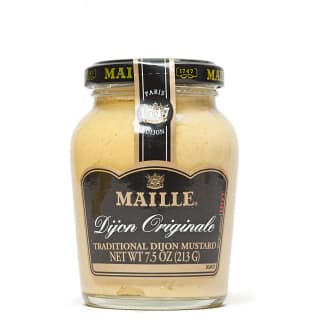
Maille Dijon Originale
A good choice for those who prefer a more moderate heat level, this “well-rounded” Dijon was “fairly spicy but not too sharp” and boasted “bright flavor typical of Dijon.”
Fat: 0.5 g
Sodium: 125 mg per teaspoon
Ingredients: Water, mustard seeds, vinegar, salt, citric acid, sulphur dioxide (preservative)
Price at Time of Testing: $4.49 for a 7.5-oz jar ($0.60 per oz)
A good choice for those who prefer a more moderate heat level, this “well-rounded” Dijon was “fairly spicy but not too sharp” and boasted “bright flavor typical of Dijon.”
Fat: 0.5 g
Sodium: 125 mg per teaspoon
Ingredients: Water, mustard seeds, vinegar, salt, citric acid, sulphur dioxide (preservative)
Price at Time of Testing: $4.49 for a 7.5-oz jar ($0.60 per oz)
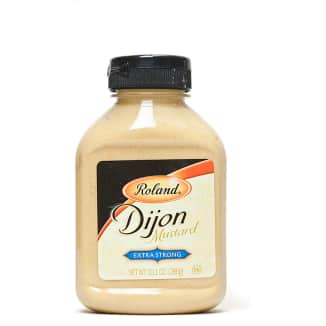
Roland Extra Strong Dijon Mustard
With “big, nasal-clearing heat” that reminded tasters of “wasabi” and “horseradish,” this mustard was rated the hottest in our lineup. That made it an especially appealing condiment on hot dogs, where it “cut through the saltiness” of the meat.
Fat: 0.5 g
Sodium: 125 mg per teaspoon
Ingredients: Water, mustard seeds, vinegar, salt, citric acid, sodium metabisulfate (as a preservative)
Price at Time of Testing: $5.16 for 10.1-oz jar ($0.51 per oz)
With “big, nasal-clearing heat” that reminded tasters of “wasabi” and “horseradish,” this mustard was rated the hottest in our lineup. That made it an especially appealing condiment on hot dogs, where it “cut through the saltiness” of the meat.
Fat: 0.5 g
Sodium: 125 mg per teaspoon
Ingredients: Water, mustard seeds, vinegar, salt, citric acid, sodium metabisulfate (as a preservative)
Price at Time of Testing: $5.16 for 10.1-oz jar ($0.51 per oz)

French’s Dijon Mustard
This mustard was fairly spicy, but some tasters lamented that its heat “doesn’t linger” as long as other products’. What they did pick up on was tanginess, noting its “kick from acid.”
Fat: 0 g
Sodium: 130 mg per teaspoon
Ingredients: Distilled vinegar, water, #1 grade mustard seed, salt, chardonnay wine, citric acid, tartaric acid, spices and turmeric
Price at Time of Testing: $2.99 for 12-oz jar ($0.25 per oz)
This mustard was fairly spicy, but some tasters lamented that its heat “doesn’t linger” as long as other products’. What they did pick up on was tanginess, noting its “kick from acid.”
Fat: 0 g
Sodium: 130 mg per teaspoon
Ingredients: Distilled vinegar, water, #1 grade mustard seed, salt, chardonnay wine, citric acid, tartaric acid, spices and turmeric
Price at Time of Testing: $2.99 for 12-oz jar ($0.25 per oz)

Koops’ Dijon Mustard
Heat-seekers wanted more zip, depth, and bite from this “mellow” Dijon. But despite that, tasters found it “bright” and “pleasant” enough to recommend it. In sum: “It would do a grilled frank justice.”
Fat: 0 g
Sodium: 120 mg per teaspoon
Ingredients: Water, mustard seed, vinegar, salt, white wine, citric acid, turmeric, tartaric acid, spices
Price at Time of Testing: $4.98 for 12-oz jar ($0.42 per oz)
Heat-seekers wanted more zip, depth, and bite from this “mellow” Dijon. But despite that, tasters found it “bright” and “pleasant” enough to recommend it. In sum: “It would do a grilled frank justice.”
Fat: 0 g
Sodium: 120 mg per teaspoon
Ingredients: Water, mustard seed, vinegar, salt, white wine, citric acid, turmeric, tartaric acid, spices
Price at Time of Testing: $4.98 for 12-oz jar ($0.42 per oz)

Grey Poupon Dijon Mustard
The “familiar” flavor of our former winner combined “sharp vinegar tang” with a “creamy” texture, which one taster deemed “mustard heaven.” But the consensus among most tasters was that this Dijon “could use more heat.”
Fat: 0 g
Sodium: 120 mg per teaspoon
Ingredients: Water, vinegar, mustard seed, salt, white wine, fruit pectin, citric acid, and tartaric acid, sugar, spice
Price at Time of Testing: $3.29 for 8-oz jar ($0.41 per oz)
The “familiar” flavor of our former winner combined “sharp vinegar tang” with a “creamy” texture, which one taster deemed “mustard heaven.” But the consensus among most tasters was that this Dijon “could use more heat.”
Fat: 0 g
Sodium: 120 mg per teaspoon
Ingredients: Water, vinegar, mustard seed, salt, white wine, fruit pectin, citric acid, and tartaric acid, sugar, spice
Price at Time of Testing: $3.29 for 8-oz jar ($0.41 per oz)
Recommended with reservations

Emeril’s Dijon Mustard
With “more vinegar than heat” and spices, this Dijon reminded tasters of “yellow mustard.” Some also noticed a “slightly sweet” and “perfumey” flavor. As one taster summed up: “It’s not a bad mustard, but it’s not Dijon.”
Fat: 0 g
Sodium: 135 mg per teaspoon
Ingredients: Distilled vinegar, water, mustard seed, salt, white wine, citric acid, tartaric acid, spices, oleoresin turmeric
Price at Time of Testing: $2.25 for 12-oz jar ($0.19 per oz)
With “more vinegar than heat” and spices, this Dijon reminded tasters of “yellow mustard.” Some also noticed a “slightly sweet” and “perfumey” flavor. As one taster summed up: “It’s not a bad mustard, but it’s not Dijon.”
Fat: 0 g
Sodium: 135 mg per teaspoon
Ingredients: Distilled vinegar, water, mustard seed, salt, white wine, citric acid, tartaric acid, spices, oleoresin turmeric
Price at Time of Testing: $2.25 for 12-oz jar ($0.19 per oz)
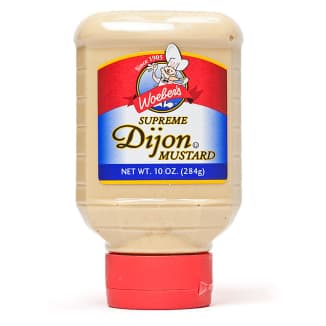
Woeber’s Supreme Dijon Mustard
Heavy on the vinegar and wine flavors and light on the spiciness, this Dijon was “tart” and “tangy”—a “middle-of-the-road” mustard, tasters said. But its bright flavor was overwhelmed by the hot dog, and it had a “slightly bitter” aftertaste.
Fat: 0 g
Sodium: 120 mg per teaspoon
Ingredients: Distilled vinegar, water, #1 mustard seed, salt, white wine, citric acid, tartaric acid, and spices
Price at Time of Testing: $6.00 for 10-oz jar ($0.60 per oz)
Heavy on the vinegar and wine flavors and light on the spiciness, this Dijon was “tart” and “tangy”—a “middle-of-the-road” mustard, tasters said. But its bright flavor was overwhelmed by the hot dog, and it had a “slightly bitter” aftertaste.
Fat: 0 g
Sodium: 120 mg per teaspoon
Ingredients: Distilled vinegar, water, #1 mustard seed, salt, white wine, citric acid, tartaric acid, and spices
Price at Time of Testing: $6.00 for 10-oz jar ($0.60 per oz)
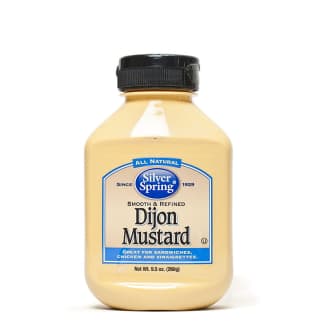
Silver Spring Dijon Mustard
Most tasters found this mustard “mellow.” On its own, it offered only a “mild” burn; on a hot dog, it tasted “a little weak.” Some even detected off-flavors in the form of a “weirdly fruity,” “slightly sweet aftertaste,” and even distracting hints of “garlic” and “clove.”
Fat: 0 g
Sodium: 45 mg per teaspoon
Ingredients: Vinegar, water, mustard seed, salt, white wine, citric acid, tartaric acid, turmeric, spices
Price at Time of Testing: $4.83 for 9.5-oz jar ($0.51 per oz)
Most tasters found this mustard “mellow.” On its own, it offered only a “mild” burn; on a hot dog, it tasted “a little weak.” Some even detected off-flavors in the form of a “weirdly fruity,” “slightly sweet aftertaste,” and even distracting hints of “garlic” and “clove.”
Fat: 0 g
Sodium: 45 mg per teaspoon
Ingredients: Vinegar, water, mustard seed, salt, white wine, citric acid, tartaric acid, turmeric, spices
Price at Time of Testing: $4.83 for 9.5-oz jar ($0.51 per oz)
Not Recommended

Inglehoffer Traditional Dijon Mustard (also sold as Beaver Mild Dijon Mustard)
Loaded with spices, sweeteners, stabilizers, and acid—and lacking salt—this was anything but traditional Dijon. Tasters likened its flavor to a “dried spice packet” and complained that it “ruined” the hot dog.
Fat: 0 g
Sodium: 60 mg per teaspoon
Ingredients: Water, white distilled vinegar, mustard seed, white wine, salt, garlic, soybean oil, sugar, high fructose corn syrup, eggs, modified corn starch, xanthan gum, spices, natural flavors, citric acid, celery seed, turmeric, annatto, calcium disodium EDTA (retains product freshness), paprika
Price at Time of Testing: $3.75 for 9-oz jar ($0.42 per oz)
Loaded with spices, sweeteners, stabilizers, and acid—and lacking salt—this was anything but traditional Dijon. Tasters likened its flavor to a “dried spice packet” and complained that it “ruined” the hot dog.
Fat: 0 g
Sodium: 60 mg per teaspoon
Ingredients: Water, white distilled vinegar, mustard seed, white wine, salt, garlic, soybean oil, sugar, high fructose corn syrup, eggs, modified corn starch, xanthan gum, spices, natural flavors, citric acid, celery seed, turmeric, annatto, calcium disodium EDTA (retains product freshness), paprika
Price at Time of Testing: $3.75 for 9-oz jar ($0.42 per oz)
*All products reviewed by America’s Test Kitchen are independently chosen, researched, and reviewed by our editors. We buy products for testing at retail locations and do not accept unsolicited samples for testing. We list suggested sources for recommended products as a convenience to our readers but do not endorse specific retailers. When you choose to purchase our editorial recommendations from the links we provide, we may earn an affiliate commission. Prices are subject to change.
Reviews You Can Trust
The mission of America’s Test Kitchen Reviews is to find the best equipment and ingredients for the home cook through rigorous, hands-on testing. Have a question or suggestion? Send us an email at atkreviews@americastestkitchen.com. We appreciate your feedback!
Reviews You Can Trust.
See Why.


